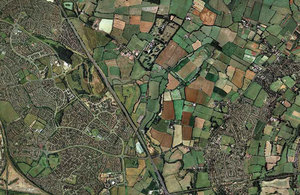First areas to push for faster brownfield land development
Pioneering councils are to help lead the way in bringing forward derelict and underused land for new homes.

Aerial view of land
Pioneering councils are to help lead the way in bringing forward derelict and underused land for new homes, Communities Secretary Greg Clark announced today (10 March 2016).
73 councils across England will pilot one of the new brownfield registers, which will provide house builders with up-to-date and publicly available information on all brownfield sites available for housing locally.
The registers will help housebuilders identify suitable sites quickly, speeding up the construction of new homes.
They will also allow communities to draw attention to local sites for listing, including in some cases derelict buildings and eyesores that are primed for redevelopment and that could attract investment to the area.
The government has pledged 1 million more homes and to get planning permission in place on 90% of suitable brownfield sites for housing. Today’s move ramps up the brownfield land building commitment.
Communities Secretary Greg Clark said:
A key part of our ambition to build 1 million homes is to get work started on brownfield sites across the country – many of which are currently nothing more than blight on a community’s landscape.
These councils will be at the forefront of these efforts to list land and encourage builders to deliver new homes for aspiring homeowners.
But this is just the first step and I would urge councils to continue to offer up brownfield sites to deliver the homes their residents want and need.
Housing Minister Brandon Lewis said:
We want to help hard working families and first time buyers to own their home and to achieve this by building on brownfield land wherever possible to help protect our valued countryside. The register helps deliver both of these at a stroke.
By getting the first councils going in piloting a register of brownfield land for housing we have the first wave of areas pushing for more homes on suitable brownfield land, including affordable housing.
The councils taking part in the brownfield pilots will inform future government policy and guidance on the operation of the brownfield registers. Registers will eventually become mandatory for all councils under proposals going through Parliament in the Housing and Planning Bill.
Other measures in the Housing and Planning Bill will enable ‘permission in principle’ to be granted for housing-led development sites listed on the new brownfield registers. This will mean developers building new homes on brownfield land will have a greater degree of certainty in relation to location, use and the amount of development.
Further information
Each council agreeing to be part of the pilot project will receive £10,000 government funding to help the establishment of their brownfield registers.
The 15 councils with the most brownfield land taking part in the brownfield register pilot project are:
- Cherwell
- County Durham
- Huntingdonshire
- Leeds
- Liverpool
- Manchester
- Medway
- Newcastle upon Tyne
- Peterborough
- Selby
- Sheffield
- South Cambridgeshire
- Sunderland
- Tonbridge and Malling
- Wigan
These have the most brownfield land in England, as identified in the final complete publication of National Land Use Database statistics.
A further 36 areas made up of 58 councils (some bids are joint) were selected on a competitive basis.
- Bassetlaw
- Bath and North East Somerset
- Blackpool
- Bolton
- Bristol City
- Broxtowe
- Bury
- Central Bedfordshire
- Colchester
- Corby
- Cornwall
- Dover
- Dudley
- East Devon
- East Northamptonshire
- East Riding
- Exeter City
- Gateshead
- Gedling
- Hart
- Hyndburn
- Kettering
- Kingston upon Hull
- Mid Devon
- Milton Keynes
- NE Lincolnshire
- North Somerset
- Northampton
- Northumberland
- Nottingham
- Oldham
- Oxford
- Pendle
- Preston City
- Rochdale
- Rossendale
- Rotherham
- Runnymede
- Rushcliffe
- Salford
- Sandwell
- South Gloucestershire
- South Ribble
- South Tyneside
- Stockport
- Stroud
- Swindon
- Tameside
- Teignbridge
- Telford & Wrekin
- Thurrock
- Torbay
- Trafford
- Walsall
- Waverley
- Wellingborough
- West Oxfordshire
- Wolverhampton
Office address and general enquiries
2 Marsham StreetLondon
SW1P 4DF
Contact form https://www.gov.uk/gui...
General enquiries: please use this number if you are a member of the public 030 3444 0000
If your enquiry is related to COVID-19 please check our guidance page first before you contact us - https://www.gov.uk/guidance/coronavirus-covid-19-guidance-for-local-government.
If you still need to contact us please use the contact form above to get in touch, because of coronavirus (COVID-19). If you send it by post it will not receive a reply within normal timescale.
Media enquiries
Email newsdesk@communities.gov.uk
Please use this number if you are a journalist wishing to speak to Press Office 0303 444 1209